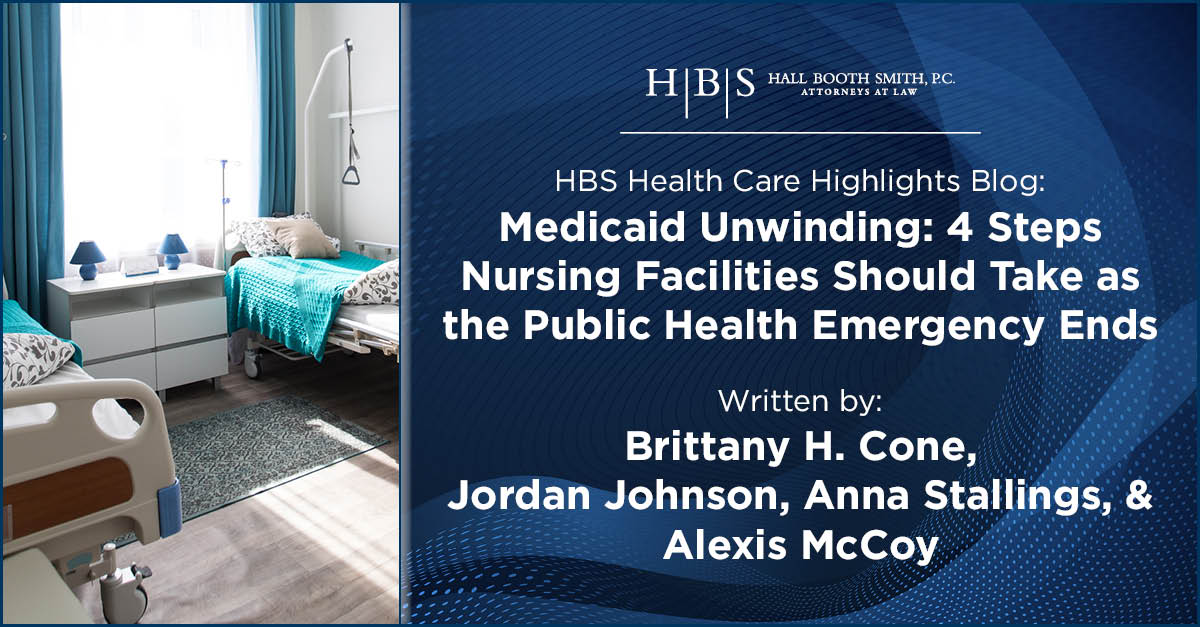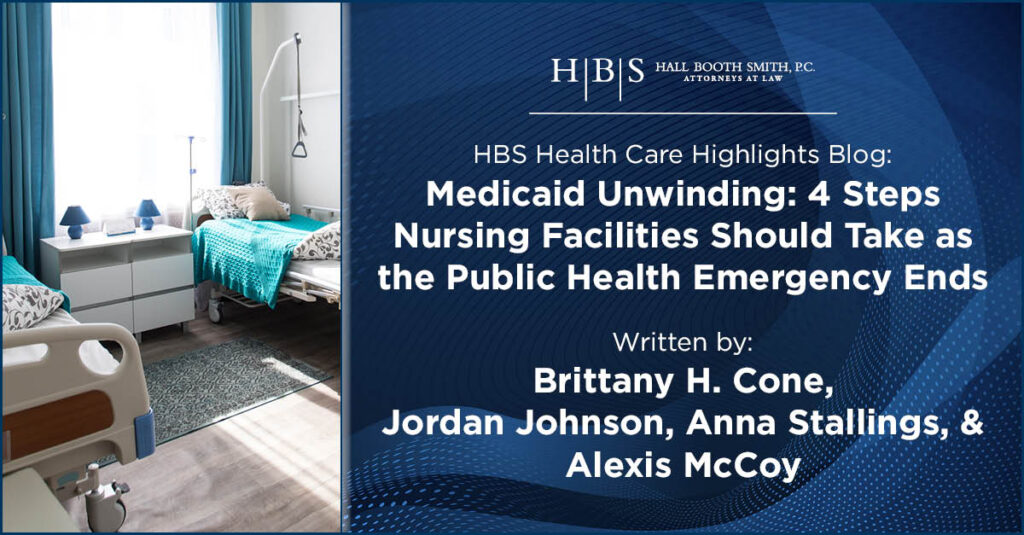
Medicaid Unwinding: 4 Steps Nursing Facilities Should Take as the Public Health Emergency Ends

Written by: Brittany H. Cone, Esq.; Jordan Johnson, Esq.; Anna Stallings, Esq.; and Alexis McCoy, Medicaid Recovery Specialist.
Introduction
At the onset of the COVID-19 pandemic, Congress passed the Families First Coronavirus Response Act (FFCRA), allowing the federal government to take on a greater share of Medicaid costs and expanding protections for consumers.
Notably, the FFCRA prevented State Medicaid agencies from terminating any individual’s Medicaid coverage for as long as the Public Health Emergency persisted in exchange for additional federal funding. This policy is known as “continuous coverage.”
Additionally, many states instituted Medicaid eligibility and verification waivers to facilitate Medicaid approvals for nursing home residents, as well as other Medicaid beneficiaries. Due to this policy of continuous coverage and other various waivers, Medicaid enrollment has increased by over 19 million recipients in the years since the FFCRA was passed.
In December of 2022, President Biden signed the Consolidated Appropriations Act (CAA) into law. This law ended the continuous coverage provided by the FFCRA, allowing for Medicaid eligibility redeterminations to begin on March 31, 2023.
In Georgia, 2.7 million applications will be reassessed within 14 months of the end of continuous coverage, with the first round of redetermination notices to be issued on April 15, 2023; however, many other states are already reporting the receipt of redetermination notices. By May 31, 2024, all Medicaid redeterminations, pending eligibility actions, disenrollments, and appeals must be completed for those recipients under continuous coverage provisions.
According to the ASPE‘s Office of Health Policy, it is anticipated that, upon redetermination, hundreds of thousands of Aged, Blind, and Disabled Medicaid recipients will be found to be ineligible and have their coverage terminated. Even more will be terminated due to easily preventable administrative issues, such as a lack of current contact information.
Here are four steps that nursing facilities should take in response to the impending Medicaid redeterminations.
Step 1: Educate on Medicaid Redeterminations, Eligibility, & Verifications
One way to ensure that a resident’s Medicaid redetermination goes smoothly is to make sure that everyone involved is informed that redeterminations have resumed.
In the nursing home context, facility staff, particularly business office and financial staff, need to be aware that redeterminations are restarting, and that the leniency ensured by the COVID-19 era policies has ended in order to have the best chance of effectively protecting residents’ Medicaid coverage.
Similarly, residents and their families need to be informed of these policy changes, including the redetermination process, eligibility details, and necessary verifications. This will ensure that they are on the lookout for correspondence from Medicaid agencies regarding their upcoming redetermination and are ready to provide any verifications that may be requested by caseworkers to effectively process their redetermination. Taking these steps can help avoid any gaps in coverage.
Step 2: Update Contact Information
The lack of updated contact information is expected to be the most preventable issue with residents’ Medicaid redeterminations.
Without corrected information, updates and redetermination notices may be sent to incorrect addresses or persons. As a result, notices, phone interviews, and verification checklists may be missed, potentially leading to the termination of Medicaid benefits. This is especially likely given the multiple-year gap between the start of the FFCRA and the present.
To make sure updates and notices are received, encourage residents or their representatives to update their contact information with the state’s Medicaid agency. For Georgia, this can be done by going to Gateway or calling 1-877-GA-DHS-GO (1-877-423-4746).
If a resident is unable to meaningfully assist with the redetermination process and has little to no familial assistance, the facility should contact the state’s Medicaid agency to inform them of the situation and request that notices be mailed to the resident’s address at the facility. In many states, an online account can be established for the resident, and contact information can be updated there. Notifications and redetermination updates can be viewed directly through this online account.
Step 3: Investigate the Resident’s Capacity & Familial Assistance
Since redeterminations have been on hold since April 2020, the facility may not have the most up-to-date information on residents’ finances, family involvement, and potentially even their capacity to make important decisions for themselves. Business/financial office staff should gather updated information to prepare for Medicaid redeterminations.
For financials, facilities should move forward with requesting updated resource documents, such as bank statements for both open and closed accounts and life insurance policies. Also, identify any potential transfer of asset concerns, including the sale of real property for less than fair market value or large transfers of funds to friends or family members. Similarly, facilities should request updated income letters for residents’ Social Security income, pensions, bank or trust accounts, and other countable income.
If a resident needs assistance with gathering the documents mentioned, facilities should contact the resident’s family members to determine if they are willing and able to assist with the Medicaid process. If a family member, friend, or other individual has the financial legal authority to assist the resident or is listed on the resident’s bank account, this information should be notated in the file as well. If it is suspected that the resident may be the victim of financial abuse or exploitation, make a report to Adult Protective Services (APS) as soon as possible.
If it is suspected that a resident may not have the capacity to make significant, responsible decisions, facilities should determine whether anyone else has the legal authority to make those decisions for the resident. Such authority may be power of attorney or guardianship/conservatorship. Moreover, it should be recommended that clinical staff perform evaluations of the resident’s capacity to determine whether the resident is able to make his/her own decisions or will need assistance.
If the resident is deemed to lack such capacity and there is no one willing or able to assist, the facility should consider filing a Petition for Guardianship/Conservatorship to have an individual appointed by the appropriate Court to assist the resident with his/her affairs. This process can take several months. As a result, it is best to begin as soon as possible in hopes of avoiding any lapses in coverage.
Step 4: Anticipate Eligibility Issues
With redeterminations imminent, now is the time for facilities to anticipate concerns with residents’ Medicaid eligibility ongoing.
Identify any residents who may be over the resource or income limit or may be unable to provide the requested verifications and develop a plan to address these issues. If a resident is over the resource limit, determine whether a spend-down in accordance with applicable state Medicaid policy is possible. Similarly, if a resident is over the income limit, determine who can establish a Qualified Income or Miller Trust on behalf of the resident in accordance with state Medicaid policy.
To stay up to date with the Medicaid unwinding in Georgia, you can go to staycovered.ga.gov. If you have additional questions, please contact anyone on our Medicaid Eligibility Program team at Hall Booth Smith. Our team includes attorneys Brittany Cone, Jordan Johnson, Anna Stallings, and Katherine Heath, as well as Reimbursement Specialists Becky Hewitt, Robin Martin, Teresa Westmoreland, and Alexis McCoy.
Disclaimer
This material is provided for informational purposes only. It is not intended to constitute legal advice nor does it create a client-lawyer relationship between Hall Booth Smith, P.C. and any recipient. Recipients should consult with counsel before taking any actions based on the information contained within this material. This material may be considered attorney advertising in some jurisdictions. Prior results do not guarantee a similar outcome.


Leave a comment
You must be logged in to post a comment.